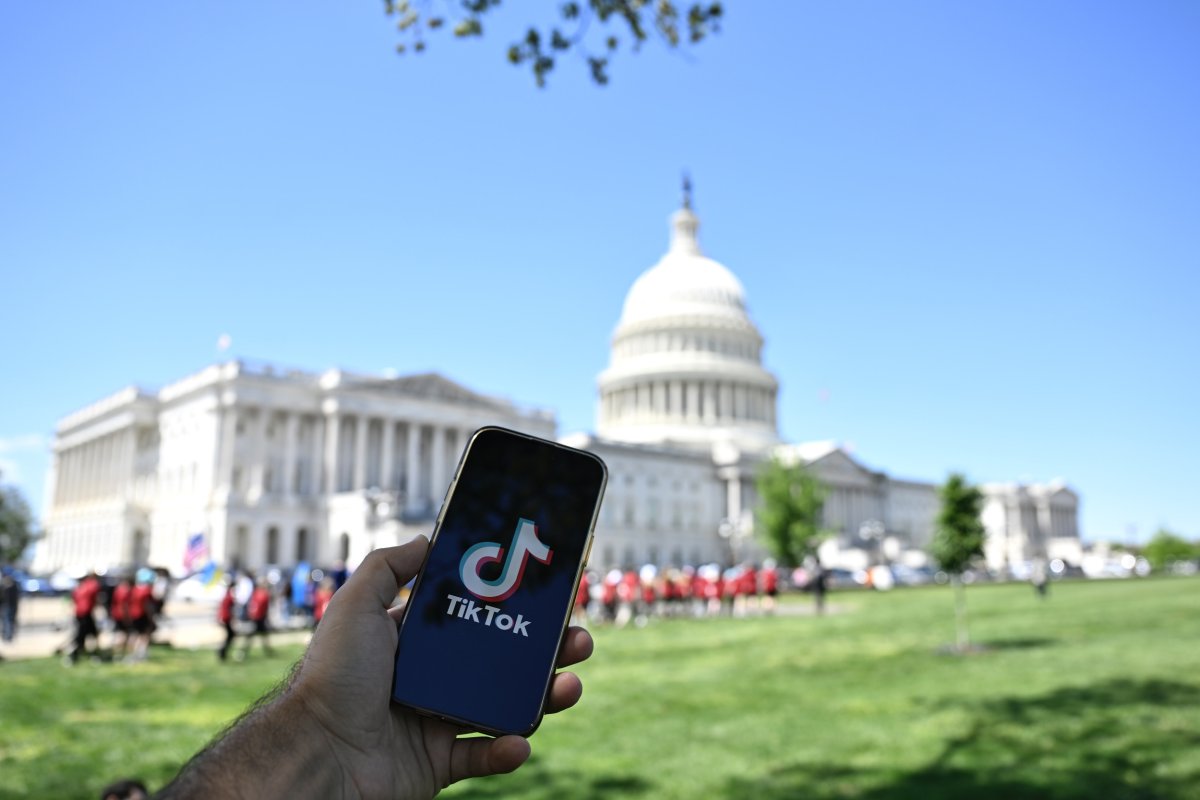The Senate on Tuesday passed legislation that will force ByteDance, the Chinese parent company of TikTok, to divest from the hugely popular video app that's used by some 170 million Americans—or else the service will be subject to a nationwide ban. President Joe Biden has suggested that he will sign the bill into law.
How Did We Get Here?
The TikTok legislation was passed by the House over the weekend after Republican Speaker Mike Johnson shoehorned it into a $95 billion foreign-aid package for U.S. allies, including Ukraine and Israel.
The House had passed a similar bill last month, but the language of that legislation has since been reworked in an effort to gain broader support in Washington. Crucially, the new bill gives ByteDance a longer timeline to divest—nine months, versus the original six. Additionally, the White House will have the power to extend that another three months if there's progress on a sale. That would give ByteDance as long as a year to figure out what to do.

Lawmakers from both sides of the aisle have supported the measure to force a sale of TikTok because of its ties to the Chinese Communist Party (CCP). Critics have said the app, in particular its powerful algorithm that surfaces what videos users see, poses a national security threat to the U.S.
ByteDance has said it is a private company not beholden to Beijing, though many experts have cast doubt on those assurances, noting that China's authoritarian government keeps a tight leash on its tech industry.
While the legislation has garnered bipartisan support, it iss also unique in how it has divided Congress, making strange bedfellows among both Democrats and Republicans who rarely, if ever, vote together. Representative Ro Khanna, a progressive Democrat from California, was joined in his 'no' vote by hard-right Republicans like Lauren Boebert of Colorado and Matt Gaetz of Florida. On the other side, liberals like Nancy Pelosi joined with conservative Republicans, including Dan Crenshaw of Texas, to support it.
Those in support of the bill mostly agree with the assessment of the U.S. intelligence community that TikTok's Chinese ownership poses a security threat. Those against have argued that it's an affront to free speech and the First Amendment. Khanna called it a sign of Washington being "out of touch" with its voters.
As for the American public, polls show opinion is decidedly mixed. About half of respondents supported a ban, according to separate surveys by the Pew Research Center and CNBC conducted in March, though younger people were far more likely to oppose.
So How Will It Work?
Assuming President Biden signs the bill into law, the nine-month clock for TikTok to find a new owner or stop operating in the U.S. will start. And so will the likely legal challenges.
TikTok CEO Shou Chew said in March the company has options that include "exercising our legal rights." Outside civil-rights groups like the ACLU could also sue on First Amendment grounds, and they have some precedent that could support the argument that the law violates the right to free speech.
Our CEO Shou Chew's response to the TikTok ban bill: pic.twitter.com/7AnDYOLD96
— TikTok Policy (@TikTokPolicy) March 13, 2024
When Montana lawmakers passed a statewide TikTok ban last year, a federal judge shot it down on the grounds that it was overly restrictive.
"Although neither side is completely correct, the State has the better argument as to the level of scrutiny that should be applied," wrote Judge Donald Molloy in his decision granting a preliminary injunction. "However, even applying intermediate scrutiny, the State fails to show how [the state ban] is constitutionally permissible."
Back in 2020, federal courts also blocked a hastily written executive order from then-President Donald Trump that sought to ban the app outright.
A successful legal challenge would likely mean the law would be blocked from going into effect while the process winds its way through the courts, potentially going all the way to the Supreme Court. That could take years.
What Is the Reaction from China?
Since the first bill started gaining steam in the House earlier this year, TikTok has spent millions of dollars on a lobbying campaign meant to pressure lawmakers to oppose a ban or forced sale. Those efforts have included an ad campaign featuring popular TikTok creators and in-app prompts and push notifications urging users to call their representatives. After those prompts were added, many lawmakers were flooded with angry—and in some cases threatening—calls from constituents, which appears to have backfired.
Representative Neal Dunn, a Republican from Florida who co-sponsored the original bill, told the BBC his office received nearly 1,000 calls in opposition to the legislation, including from "vulnerable school-aged children."
"This effort by ByteDance validated the Congressman's concerns," his office said in a statement.
The Chinese government, for its part, opposes a sale and would have to sign off should ByteDance decide to divest its U.S. TikTok business. In 2020, Beijing issued new export control rules that were broadened to cover certain technologies, potentially including TikTok's valuable algorithm.
It appears likely that those rules could be used to keep ByteDance from relinquishing the app's underlying technology to a foreign company, leading to the question: What is TikTok's value without the algorithm that has made it such a colossal success?
Uncommon Knowledge
Newsweek is committed to challenging conventional wisdom and finding connections in the search for common ground.
Newsweek is committed to challenging conventional wisdom and finding connections in the search for common ground.
fairness meter
To Rate This Article
About the writer
To read how Newsweek uses AI as a newsroom tool, Click here.








